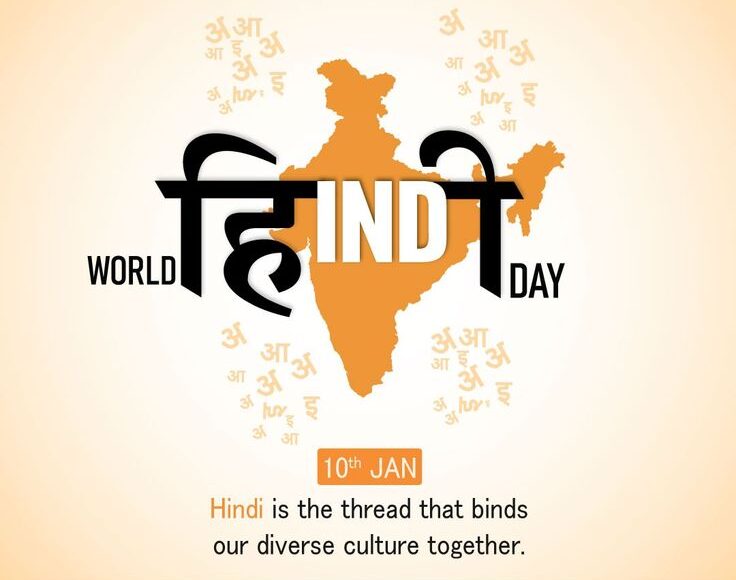🪔 Introduction: Celebrating the Voice of Bharat on the Global Stage
Languages shape identity, culture, and consciousness. And Hindi, spoken by over 600 million people worldwide, isn’t just a language—it’s an emotion, a cultural force, and a proud symbol of Indian heritage.
- 📜 History of World Hindi Day
- 📅 Timeline of World Hindi Day Milestones
- 🧠 10 Fascinating Facts About World Hindi Day
- ❓ Frequently Asked Questions (FAQs)
- 📌 What is the purpose of World Hindi Day?
- 📌 How is it different from Hindi Diwas?
- 📌 Who celebrates World Hindi Day?
- 📌 Why promote Hindi globally?
- 🎯 Importance and Significance of World Hindi Day
- 1. Cultural Identity
- 2. Diplomatic Soft Power
- 3. Unity in Diversity
- 4. Global Learning and Academic Value
- 5. Technological & Linguistic Innovation
- 🌏 Observance and Activities on World Hindi Day
- 💬 Inspiring Wishes for World Hindi Day
- 📌 Important Points to Remember
- 🧬 Importance in Our Lives
- 🧘♂️ Societal and Global Impact
- 🪔 Conclusion: Hindi Is the Light That Shines Across Borders
Every year on January 10, we celebrate World Hindi Day (Vishwa Hindi Diwas)—a day that goes beyond vocabulary and grammar, honoring the spirit of unity, expression, and heritage that Hindi carries across generations and continents.
📜 History of World Hindi Day
The origins of World Hindi Day trace back to January 10, 1975, when the first World Hindi Conference was held in Nagpur, Maharashtra, inaugurated by then Prime Minister Indira Gandhi. The aim was to promote Hindi globally as a language of expression, literature, and diplomacy.
Recognizing its importance, the Government of India declared January 10 as World Hindi Day in 2006, under the initiative of Dr. Manmohan Singh, the then Prime Minister. Unlike Hindi Diwas celebrated on September 14 (which focuses on national promotion), World Hindi Day emphasizes global outreach.
📅 Timeline of World Hindi Day Milestones
| Year | Milestone |
|---|---|
| 1975 | First World Hindi Conference in Nagpur |
| 1983 | 2nd Conference in Mauritius |
| 2006 | First official World Hindi Day observed |
| 2007-2023 | Celebrated annually in Indian embassies and international institutions |
| 2022 | 12th World Hindi Conference held virtually with global participation |
| 2025 (Upcoming) | Plans underway to include Hindi in the UN official languages |
🧠 10 Fascinating Facts About World Hindi Day
Hindi is the 3rd most spoken language in the world after English and Mandarin.
The Devanagari script, in which Hindi is written, has over 11 vowels and 33 consonants.
Over 50 countries celebrate World Hindi Day through cultural programs and language workshops.
Indian embassies abroad organize essay competitions, poetry readings, and speeches in Hindi.
Several UNESCO-recognized works of literature have been composed in Hindi.
The word ‘Hindi’ comes from the Persian word ‘Hind’, meaning the land of the Indus River.
UNESCO and other global agencies have supported the promotion of Hindi via subtitled content.
Mauritius, Fiji, Suriname, and Trinidad have a significant Hindi-speaking population.
Hindi has inspired hundreds of foreign learners, with courses now available in major universities like Oxford, Tokyo, Moscow, and more.
Bollywood and Hindi music are often the first exposure to Indian culture for foreigners.
❓ Frequently Asked Questions (FAQs)
📌 What is the purpose of World Hindi Day?
To promote the Hindi language globally, strengthen cultural ties, and celebrate its literary and linguistic richness.
📌 How is it different from Hindi Diwas?
Hindi Diwas (September 14) celebrates the adoption of Hindi as an official language of India in 1949. World Hindi Day (January 10) focuses on international promotion and recognition.
📌 Who celebrates World Hindi Day?
Indian embassies
Cultural organizations
Schools and universities
Linguistic institutions globally
📌 Why promote Hindi globally?
Hindi carries a deep literary, spiritual, and emotional significance. Promoting it globally spreads Indian culture and encourages linguistic diversity.
🎯 Importance and Significance of World Hindi Day
1. Cultural Identity
Hindi is the heartbeat of Indian identity. Through proverbs, folk tales, devotional songs, and poems, it preserves centuries of wisdom and history.
2. Diplomatic Soft Power
India’s global stature is rising, and promoting Hindi contributes to soft diplomacy, building cultural bridges through language.
3. Unity in Diversity
Hindi, while not the mother tongue of all Indians, serves as a common link that connects people from diverse linguistic backgrounds.
4. Global Learning and Academic Value
Top universities across the world offer Hindi as a subject, fostering intercultural academic exchange.
5. Technological & Linguistic Innovation
Google, Microsoft, and Apple now support Hindi across platforms, encouraging inclusivity in digital communication.
🌏 Observance and Activities on World Hindi Day
On January 10, various events take place around the globe:
Cultural events and poetry recitations in Indian embassies
Online Hindi quizzes, workshops, and essay competitions
Webinars by Hindi scholars on global linguistic trends
Community events by NRI and PIO (Persons of Indian Origin) groups
Award ceremonies recognizing contribution to Hindi literature and teaching
💬 Inspiring Wishes for World Hindi Day
🪔 “Hindi is not just a language—it’s the soul of India. Happy World Hindi Day!”
📚 “Let’s celebrate the language that binds a billion hearts. शुभ विश्व हिंदी दिवस!”
🌍 “From Bharat to the world—let Hindi echo through art, poetry, and love.”
🗣️ “On this World Hindi Day, speak with pride, write with joy, and read with reverence.”
✍️ “May the melody of Hindi reach every heart across every continent. जय हिंदी!”
📌 Important Points to Remember
Observed every year on January 10
Promotes Hindi globally, not just within India
Initiated by Indian Government in 2006
First conference held in 1975 at Nagpur
Celebrated in over 50+ countries
Supports cultural diplomacy, education, and digital inclusivity
🧬 Importance in Our Lives
🌟 Hindi in Daily Conversations
For many Indians, Hindi is the language of emotion, thought, and creativity—from movies to music to memes.
🧠 Hindi in Education
Schools and universities are integrating modern Hindi literature, spoken Hindi programs, and even Hindi journalism into their curriculum.
💻 Hindi in Technology
With voice assistants like Alexa and Google supporting Hindi, it’s becoming integral to digital literacy and access.
🪔 Hindi in Culture
From Kabir’s dohas to modern poetry slams, Hindi continues to evolve while remaining rooted in spirituality, philosophy, and love.
🧘♂️ Societal and Global Impact
✈️ Cultural Diplomacy
Promoting Hindi encourages cross-cultural communication and strengthens India’s soft power globally.
🏫 Language Learning and Employment
With Hindi gaining popularity globally, it’s creating new job opportunities in translation, teaching, journalism, and tourism.
🤝 Strengthening NRI Identity
For Non-Resident Indians, Hindi serves as a cultural lifeline, helping second- and third-generation immigrants stay connected to their roots.
🪔 Conclusion: Hindi Is the Light That Shines Across Borders
World Hindi Day is more than a celebration—it is a global movement. In a world increasingly divided, language can unite. And Hindi, with its emotional richness and cultural depth, has the power to inspire harmony, identity, and inclusivity.
Let us speak it with pride, teach it with love, and honor it with gratitude—because Hindi is not just a language, it’s a celebration of being Indian.








